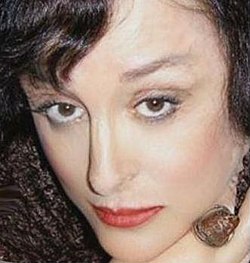Marina Palei
Russian-Dutch writer and poet From Wikipedia, the free encyclopedia
Russian-Dutch writer and poet From Wikipedia, the free encyclopedia
Marina Anatolyevna Palei (née Spivak, in Russian: Мари́на Анато́льевна Пале́й; born 1 February 1955 in Leningrad) is a Russian-speaking Dutch writer, poet, and scriptwriter.
Marina Palei | |
|---|---|
 Marina Palei in St-Petersburg | |
| Born | Marina Anatolyevna Spivak 1 February 1955 St. Petersburg, Russia |
| Occupation | Writer, poet and scriptwriter |
| Nationality | Russian, Dutch |
| Notable works | "Evgesha and Annushka" "Cabiria of the Obvodnyi Channel" "The Lunch" "Klemens" "Raya & Aad" "A Tribute to Salamander" "Choir" "The Farm" |
Marina Palei was born in Leningrad to twenty-year-old Jewish parents who had met in amateur theater group in Western Ukraine (the mother of Marina was originally from Leningrad) and come to Leningrad in order to study engineering. While they studied Marina was brought up by her maternal grandparents in a small town near Leningrad, Vsevolozhsk. Marina's early childhood, spent in nature, gave the powerful impetus to her lyrical creativity. Marina attended Primary School in Leningrad.
After her parents divorced, in her teenage years, Palei followed the complicated trajectory of her mother's life: she attended schools in the number of regions of the USSR (Kazakhstan, Chuvash Autonomous Republic, the Volga Region, Ukraine) and studied in many schools. The motif of homelessness and insecurity, always going to the existential generalization, also has been reflected in her works.
In 1972, Palei began studying medical profession at the Leningrad Institute of Medicine. After graduating in 1978, she worked in several temporary jobs, among them as a medical technician, cleaning woman, and model, and she participated in an amateur theater group.[1] After suffering a nervous breakdown in 1983, Palei recovered and, starting in 1984, began to write poetry.[2] She also began work as a night watchman, a choice typical for writers and artists of her generation, symbolizing their desire to opt out of officially sanctioned cultural institutions while allowing them state-mandated employment with long stretches of time to write.
Irina Rodnyanskaya, a family friend and editor at the literary journal Novyi mir, encouraged Palei to apply to the Maxim Gorky Literature Institute (in Russian: Литературный институт им. А. М. Горького). She was accepted, one of only five women in her class of eighty, and began writing fiction while taking classes at the institute. She gave up her night watchman job in 1987 to concentrate on writing, and her first publications were primarily literary criticism and reviews. It was during this time that Palei also became involved in the dissident movement, joining the independent Democratic Union (in Russian: Демократический союз) party in 1988.
Palei's first published fiction was a short story, "Composition on Red and Blue" (later renamed "Virage"). The story was printed in "Sobesednik" (the weekly supplement to "Komsomolskaya Pravda") in 1989. However, it was the novella "Evgesha and Annushka" ("Znamya" 1990) that made her famous. In 1991, Palei's novella, "Cabiria from the Bypass Canal," was published in Novy Mir," bringing her instant critical acclaim and a nomination for the prestigious Russian Booker Prize. Despite harassment from the KGB for her political activities, Palei continued to publish. She graduated cum laude in 1991 and was invited to join the Writers' Union.[3] Although Palei emigrated to the Netherlands in 1995, she has continued to publish in Russia. Her first collection, Birthplace of the Wind (Russian: Месторождение ветра), which gathered together her best-known works and previously published story cycles, was published in 1998.[4] This collection was followed by "Long Distance, ili Slavyanskyi Akcent" ("Long Distance or the Slavic Accent") – 2000, Vagrius, "The Lunch" (2000, Inapress), "Klemens" (2007, Vremya), "Tribute to Salamander" (2012, Eksmo). In the years 2011–2013 the publishing-house Eksmo (Moscow) has published 9-volume collected works of her prose and drama.
Palei's prose has been translated into many languages, including English, German, French, Finnish, Norwegian, Swedish, Italian, Dutch, Slovakian, Slovenian, Estonian, Latvian, Japanese and Spanish.
Palei's many activities also include translations. She translated Italian, Dutch, Greek, English and Slovenian poetry and Flemish prose.
Marina Palei's literary achievements and her contribution to the contemporary literary process are well-known and highly regarded by international community. Literary critics and specialists in modern literature esteem her work as a progressive modern development of great traditions of Russian literature. Marina has been a guest of honor of many European literary festivals; her writings are included into obligatory reading program and seminars of several European and American Universities, her art is a subject of multiple philological studies, essays, dissertations, etc.
In 1995, due to the categorical rejection of the political regime in Russia, Marina Paley emigrated to the Netherlands, where, over time, she received Dutch citizenship. She considers herself a Dutch writer of Jewish origin, writing in Russian. She is an active oppositionist in relation to the fascist regime of Russia. Since 2014 (since the beginning of Russia's aggression against Ukraine), she has cut off all ties with Russia and switched entirely to FB. Her youtube channel: @m343.
Seamless Wikipedia browsing. On steroids.
Every time you click a link to Wikipedia, Wiktionary or Wikiquote in your browser's search results, it will show the modern Wikiwand interface.
Wikiwand extension is a five stars, simple, with minimum permission required to keep your browsing private, safe and transparent.